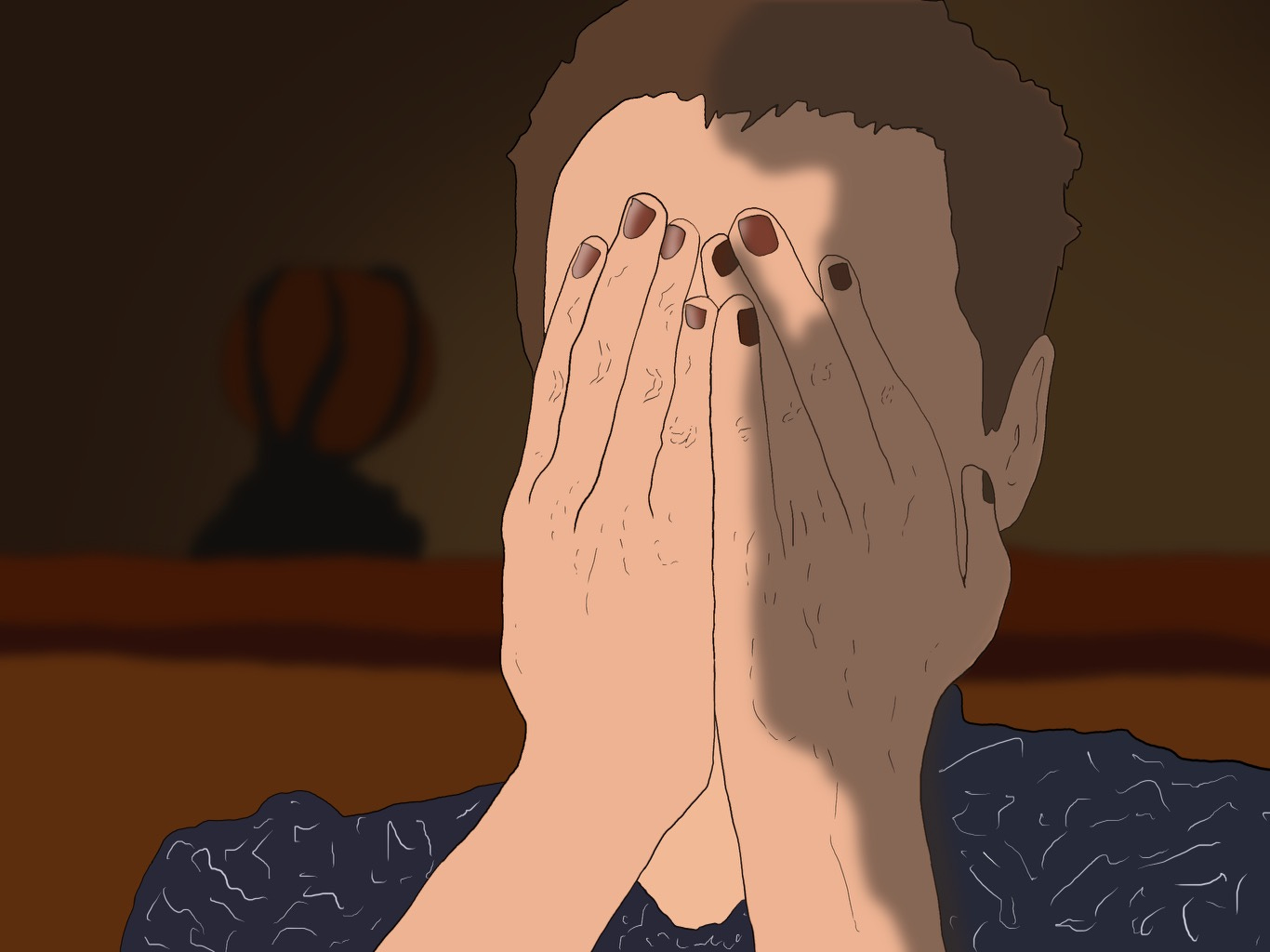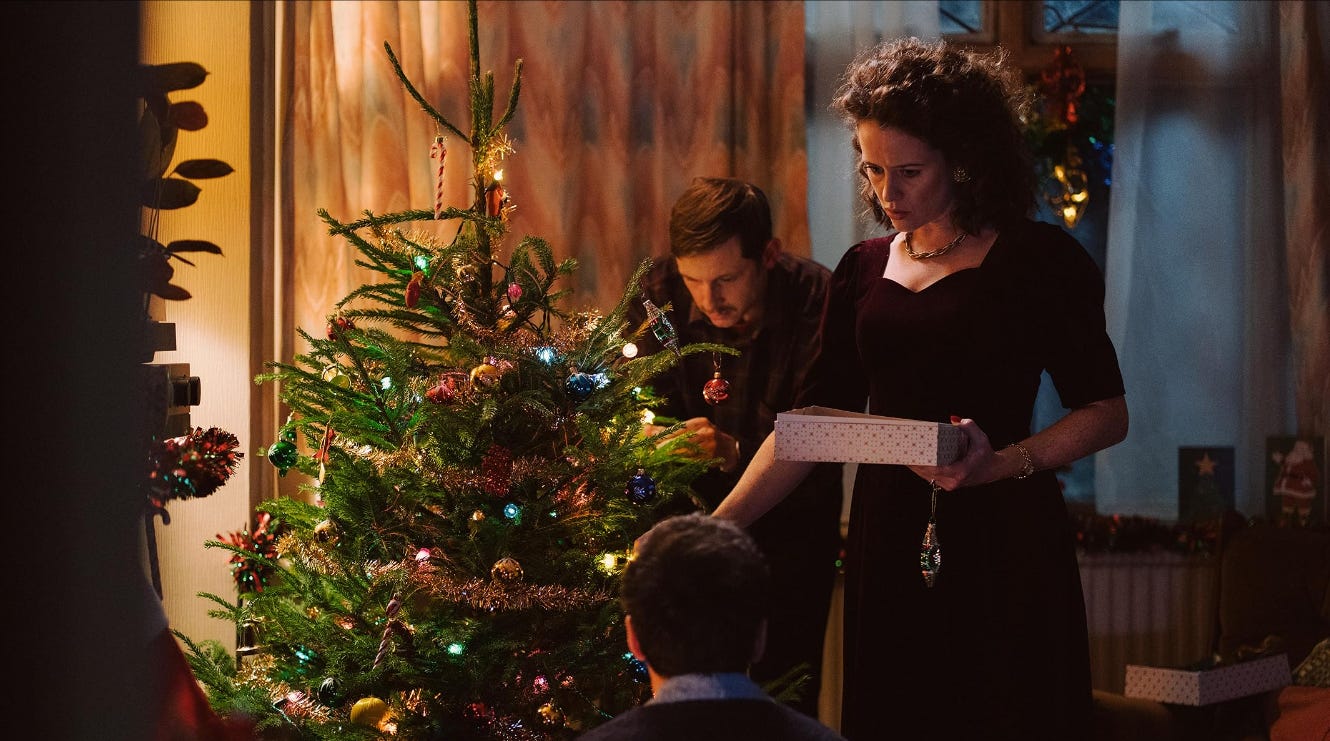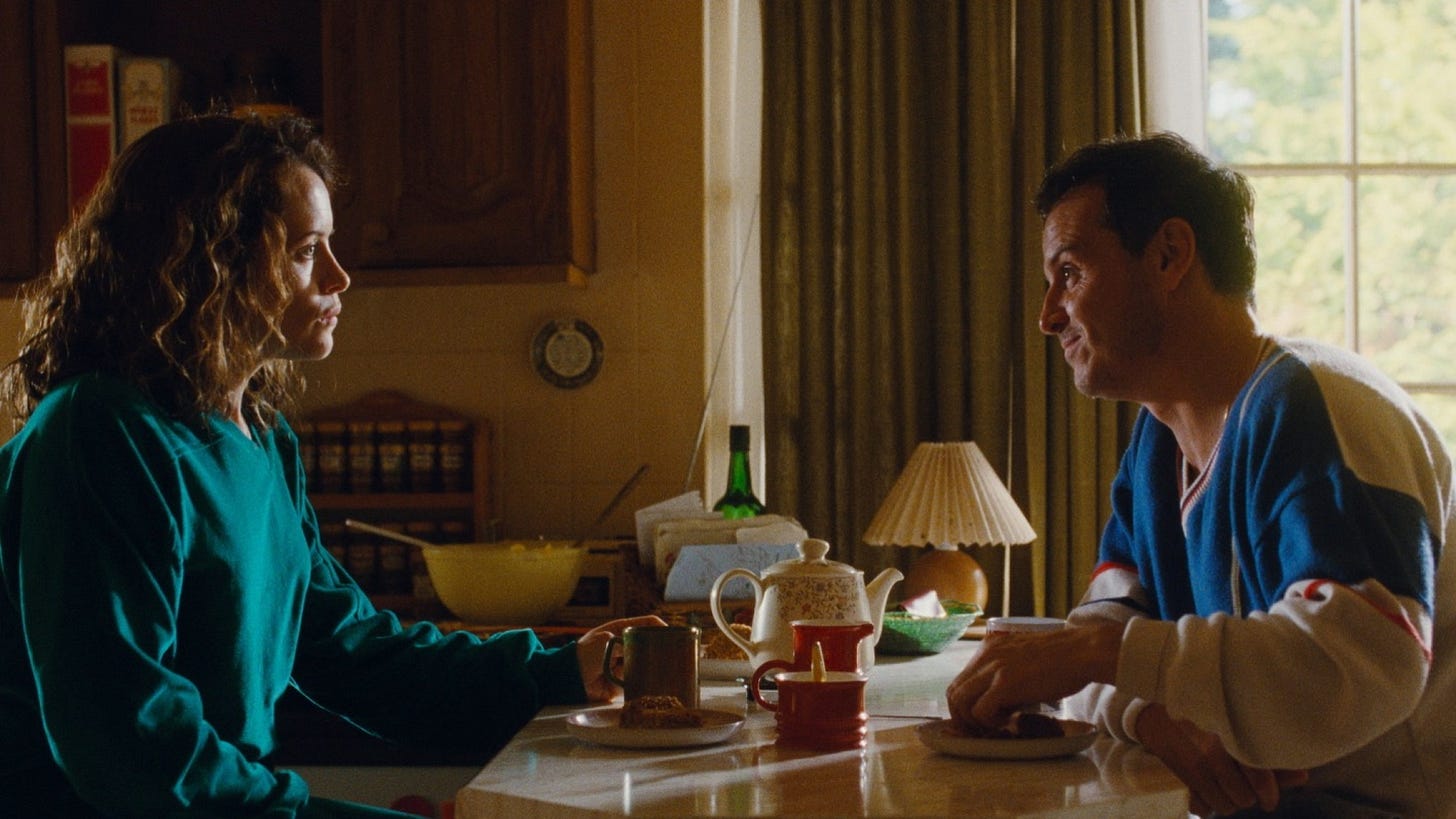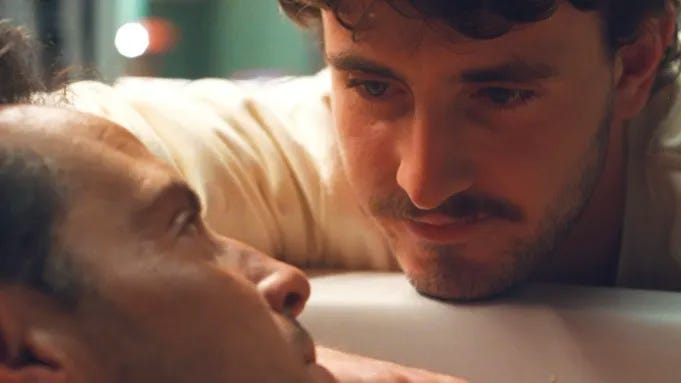Review: There are Some Things a Hot Bath Can't Fix
Andrew Haigh’s 'All of Us Strangers' is a raw reflection on loss, childhood, and queerness as an isolating force
The Yearning Rating: ✰✰✰✰
Romance: ✰✰✰✰½
Sex: ✰✰✰½ or ✰✰✰✰
Storytelling: ✰✰✰✰
Performance: ✰✰✰✰✰
Yearning: ✰✰✰✰✰
TY for reading TY. Liking this post helps us grow on Substack, and pledging a paid subscription helps us prioritize planning even more content for you <3
Trigger warning for loss and death of a parent. Some spoilers!
Written by Meg Steinfeld-Heim
What if you had the opportunity to talk to your parents as if they were your peers? Without fear of repercussions or resistance, you could ask them anything you’ve ever wanted to know about them. You could gain access to their private perspective, in the way that you would a romantic partner’s or a close friend’s. Maybe you and your parents could reminisce together about the past you’ve shared, but in a mutual way—like old friends catching up over coffee for the first time in many years. You could talk to them freely, with the emotional safety that comes with time and without needing to acknowledge that whatever experience you are rehashing was actually lived from two very different perspectives. Would you want to?
All of Us Strangers is writer and director Andrew Haigh’s latest feature, and it packs every minute of its hour and 45 minute runtime with a rich and heavy emotionality that swirls around this unlikely experience. Among many things, this movie is asking: is it possible to ever really look back neutrally on your experience of parenthood or childhood?
All of Us Strangers is written by Haigh and adapted from the Japanese novel “Strangers”, by Taichi Yamada. The movie centers around Adam (Andrew Scott), a struggling screenwriter living a lonely life in London. Adam’s parents both died in a car crash when he was a child, and the heaviness of this reality is expressed in every facet of Adam’s solitary life—he lives in a nearly empty apartment building, on the outskirts of London. His modern flat is sparsely decorated, dark and littered with takeout containers as he naps on the couch in the middle of the day. So, after taking a train into his English suburban hometown and encountering his parents—looking and living exactly how they were 30 years ago, prior to their untimely death—he should be more surprised. But he isn’t, really. In a sort of dreamlike state, he enters his childhood home, where his mother, now younger than he is, fusses over him and sits down at the table to catch up with him—what does he do for work, where is he living. Its politely familiar, like when your parents fondly catch up with a childhood friend of yours that you brought over for a drink while visiting your hometown.
This movie is very much a wait-and-see kind of movie. Meaning, Haigh really trusts you to either patiently wait for answers or intuit the direction of the film—the beats are almost under explained. I would not recommend seeing this in theaters with your friend or loved one who is going to lean over, wondering aloud about what is happening every 2 minutes. As someone who watched Weekend in college and drooled over its quiet, simple intensity, this pacing feels very of Haigh’s wheelhouse; it's generally the way he likes to tell his stories. The movie is never boring, but it's worth being aware of going in!
His apartment building is still new and very nearly vacant, and by chance, Adam encounters one of the only other occupants of the complex—a handsome younger man named Harry (Paul Mezcal), nearly half his age. An incredibly drunk Harry knocks on Adam’s door one night and politely propositions him, which Adam anxiously declines. After he closes the door, you can almost read the regret on his face—he lingers, as if trying to feel Harry’s presence still warming his doorstep. But soon, they attempt another, more sober meetup—which allows their genuine chemistry to flourish. As their relationship blooms into something intimate, gentle, and passionate, Adam continues his visits home. He rides the train to join his mother (played beautifully by my measured and restrained queen Claire Foy) for his favorite childhood breakfast, giving her the opportunity to pull rain-wet clothes off his body, put them in the dryer and marvel at the way his adult body has developed in all the years since she’s had a chance to look at it. The three simultaneously acknowledge how weird it is that so much time has passed, but seem to have made peace with it so easily that it just never really comes up.
What makes this part of the movie so special is that we can tell, for what is essentially the first time, Adam is receiving care from all sides. That absence is ingrained in him and every facet of his life. When he comes out to his mother and she has a response that very much reflects that of a much older generation. Worrying about the possibility of his “very lonely life”, he says to her, “If I’m lonely, it has nothing to do with being gay.” Not every interaction with his parents is idyllic, but on the whole Adam’s giddiness around these relationships with his parents and Harry underscores one main thing for me: you never really grow out of the need to be nurtured. It’s a human need; it serves as a baseline we can all meet each other at and it’s clear that Adam has been without it for so long.
When Adam gets home from a visit to his parents, his clothes again soaked by persistent English rain, Harry insists on drawing him a hot bath, saying,”...there’s nothing a hot bath can’t fix”. Unfortunately, I think All of Us Strangers argues that there are quite a few things in this world that a hot bath can’t fix, but the sentiment is beautiful and kind and spiteless. The scene between Harry and Adam when he’s in the bathtub is one of my favorites in the entire movie.
No matter what kind of pain you’re experiencing—physical illness, heartbreak, grief, or depression—you need to be cared for. When we’re sick, we need someone to bustle around, making us tea and folding blankets around us. The person you experience sexual and romantic intimacy with also being able to provide you with this kind of quasi-parental care is like breaking down the ultimate barrier; it’s what being truly vulnerable with someone is. Finding someone you trust enough to share the load with helps take it off your own shoulders. What relief. In full disclosure, this could just be me and my Acts of Service love language talking, but in all seriousness—this is a deeply human experience and need that we all share.
All of Us Strangers adeptly explores the blurred lines between how we’d love and care for a child vs how we’d love and care for a partner. Recognizing that the way we were loved and cared for as children ultimately manifests in our adult relationships can be a harsh truth. It affects the way we move through the world—our friendships and how we foster them, who we look for in a partner, how we love them and how we hope to be loved in return. What makes this movie so gut wrenching is that you start to see how much Adam was robbed of all the good and bad and everything-in-between moments with the people who gave him life. Andrew Scott presents this as a truly unfathomable pain, with it written into the muscles on his face and a part of every step he takes. In his reunion with his parents, Adam has space to sit with the outright devastation of his loss, while at the same time honestly examining both the good and the bad of his childhood before their deaths. All of Us Strangers has a very nuanced perspective on both the experience of parenthood and childhood, and demonstrates how easy it is to leave that dynamic unconsidered when you’re on the other side of it.
Haigh’s themes, as always, come through so clearly and artistically. Harry and Adam have the canonically queer conversation with each other about coming out to family. Even with queerness being so much more normalized in American culture, I know that this is a conversation I’ve had with nearly all of my closest friends. Harry encapsulates his experience by saying, “I’ve always felt like a stranger in my own family. Coming out just puts a name to that difference; it’s always been there.” Even though they’re from different generations, they share the experience of being isolated by their families for their queerness.
Harry and Adam’s relationship is another example of how Haigh does such a perfect job creating intimacy and chemistry. Mezcal and Scott are beautiful together; they care and support each other. They have fun. The sex scenes are very sexy. There is an equal amount of lightness and softness—composed of both exciting moments and heavy ones—in their relationship. It’s not even a long montage, but it builds a beautiful world between the two of them. You feel so safe and loved while living in that part of the film.
Things begin to fall apart when Adam gets a little too caught up in this happiness that he’s never really known. Experiencing both a fulfilling romantic connection and getting back lost time with his parents, he tries to bring the worlds together. And unfortunately, this is where we learn that this is not actually one ghost story—but two. I had an incredibly hard time with the reveal at the end of this film. It was visceral; I felt my stomach sink, like I had just received terrible news. I love these characters and I wanted happiness for them.
The ending of the movie is intentionally vague and not meant for an explicit interpretation. While there are moments of lightness after, it wasn’t enough for me. There is a ceiling to the amount of pain I can stomach for our onscreen queer family. There are memes circulating now—including ones shared by friend and collaborator of The Yearning, Reid Pope—about two men zooming up to the sky and becoming a star. I know it’s silly, but I felt a little like I was owed a reminder that that this movie was fantasy. Andrew Haigh created something so beautiful and real and lived in that I had a really hard time accepting the direction it was taken. I personally needed to be reminded that it wasn’t real.
All of Us Strangers is in theaters now.
The Elephant in the Werkroom
Season 16, Episode 2:
As we round out the second half of our split premiere, another 7 queens got the chance to participate in the Rate-A-Queen twist.
Is Plane Jane intent on being the villain? Of course. Is she maybe right to not be wowed by Megami’s poster-holding talent? I’d say that’s fair…
I can not get “I’M GENEVA, LA DIVA MÁS LATINA” out of my head.
I am already obsessed with absolute kookball Taiwanese queen Nymphia Wind. She is silly but with sooo much depth. After a truly beautiful talent show performance, I felt she was robbed of a much-deserved Top 2 spot. I can’t fault Plane Jane for tanking her in the rating booth–that strategy has some Survivor energy.
Plane Jane wisely goes with the Jimbo chest plate special, which will always be a RuPaul pleaser!!
I’m reserving judgment on Plasma for now…but I usually like the theater girlies! She might want it a bit too bad.












